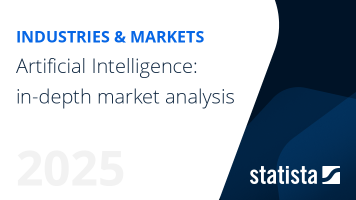AI Industrial Robotics - South Korea
South Korea- The market size in the AI Industrial Robotics market is projected to reach US$238.93m in 2025.
- The market size is expected to show an annual growth rate (CAGR 2025-2031) of 26.34%, resulting in a market volume of US$971.82m by 2031.
- In global comparison, the largest market size will be United States (US$4.92bn in 2025).
Definition:
Artificial intelligence (AI) industrial robotics refers to the integration of artificial intelligence technologies and capabilities into industrial robots for enhanced automation and intelligent decision-making in manufacturing and industrial processes. These robots are equipped with AI algorithms, machine learning, computer vision, and other AI techniques to perform tasks such as assembly, material handling, quality control, and predictive maintenance with higher precision, efficiency, and adaptability. By leveraging AI, industrial robots can analyze data, learn from experience, and optimize their operations in terms of increased productivity, reduced costs, improved safety, and streamlined manufacturing workflows in various industries.
The market comprises two key performance indicators: market sizes and market sizes by industry. Market sizes are generated by the funding amount of Artificial Intelligence Industrial Robotics companies and market revenue data from the Statista robotics market. Key players of the market include companies such as Universal Robots, ABB, and Fanuc.
For more information on the data displayed, use the info button right next to the boxes.
- Collaborative robots (cobots) that collaborate with human workers, such as Universal Robots' UR5 and UR10
- Automated guided vehicles (AGVs) that move materials and products through a manufacturing plant, such as KION Group's Linde Robotics
- Robot arms that perform repetitive tasks on an assembly line, such as ABB's YuMi and Fanuc's LR Mate.
- Drones used for surveying or inspecting industrial sites, such as DJI's Matrice series and Parrot's ANAFI USA
- Self-driving cars or trucks used for transportation of goods or people, such as Tesla's Semi and Waymo's autonomous vans
- Virtual assistants or chatbots used for customer service and/or sales support, such as IBM Watson Assistant and Google Dialogflow.








